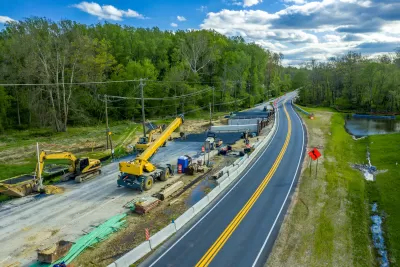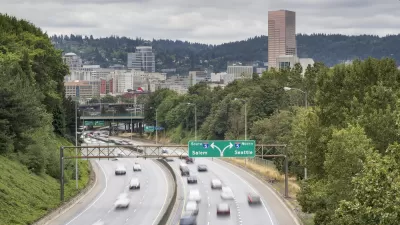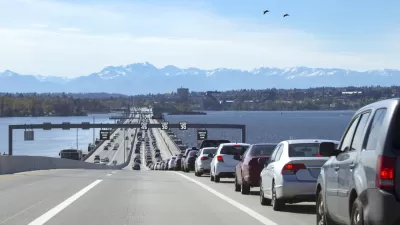New research shows that the economic benefits of roadbuilding projects don’t come close to exceeding most projects’ costs.

A new study published in the Journal of the American Planning Association highlights the high cost and low return of road expansion projects in urban areas, reports Maria Clara Cobo in Bloomberg CityLab. According to the study, the monetary value of purported time savings doesn’t have “anything close to the economic benefits that state and federal policymakers hope for.”
As Cobo explains, “The researchers considered several kinds of costs: They looked at direct government spending on roads, external costs such as pollution and traffic deaths and the value of roadway land that could otherwise be used for different purposes like housing, shops or public space.” When accounting for direct government spending alone, costs exceeded benefits by 17 percent.
However, the study focused on a new assessment of land value and how much space is dedicated to roadways, which adds significantly to the total cost of road projects. “Their estimate finds that roads account for a fifth to a quarter of all urbanized land in the US — that’s equal to the total area of West Virginia.” This land is valued at roughly $5.4 trillion in today’s dollars.
The research contradicts the popular belief — and assessments by the U.S. Department of Transportation (USDOT) — that highway widening projects benefit local economies. Moreover, “[The study finds] that reducing roadway area by 10% would yield a net benefit of nearly $28 billion a year.”
FULL STORY: The Outsized Cost of Expanding US Roads

Alabama: Trump Terminates Settlements for Black Communities Harmed By Raw Sewage
Trump deemed the landmark civil rights agreement “illegal DEI and environmental justice policy.”

Study: Maui’s Plan to Convert Vacation Rentals to Long-Term Housing Could Cause Nearly $1 Billion Economic Loss
The plan would reduce visitor accommodation by 25% resulting in 1,900 jobs lost.

Planetizen Federal Action Tracker
A weekly monitor of how Trump’s orders and actions are impacting planners and planning in America.

Wind Energy on the Rise Despite Federal Policy Reversal
The Trump administration is revoking federal support for renewable energy, but demand for new projects continues unabated.

Passengers Flock to Caltrain After Electrification
The new electric trains are running faster and more reliably, leading to strong ridership growth on the Bay Area rail system.

Texas Churches Rally Behind ‘Yes in God’s Back Yard’ Legislation
Religious leaders want the state to reduce zoning regulations to streamline leasing church-owned land to housing developers.
Urban Design for Planners 1: Software Tools
This six-course series explores essential urban design concepts using open source software and equips planners with the tools they need to participate fully in the urban design process.
Planning for Universal Design
Learn the tools for implementing Universal Design in planning regulations.
Caltrans
Smith Gee Studio
Institute for Housing and Urban Development Studies (IHS)
City of Grandview
Harvard GSD Executive Education
Toledo-Lucas County Plan Commissions
Salt Lake City
NYU Wagner Graduate School of Public Service





























